#palestinian history
Text
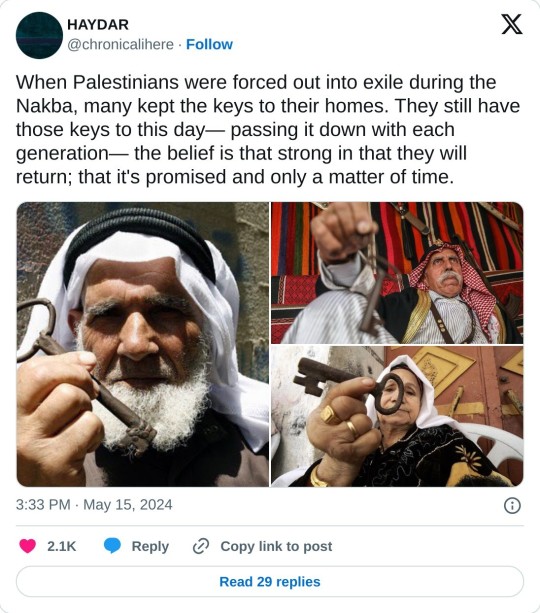
From the river to the sea, Palestine will be free
#yemen#jerusalem#tel aviv#current events#palestine#free palestine#gaza#free gaza#news on gaza#palestine news#news update#war news#war on gaza#nakba#nakba 1948#palestinian history#colonialism#settler colonialism#end the occupation#from the river to the sea palestine will be free
713 notes
·
View notes
Text
On May 15, 1948, more than 750,000 Palestinians were violently expelled from their ancestral land, while Isr@eli forces destroyed 500 villages and towns to establish the Zionist state.
Today, 76 years later, “the Nakba never ended”, and the photos are in color.
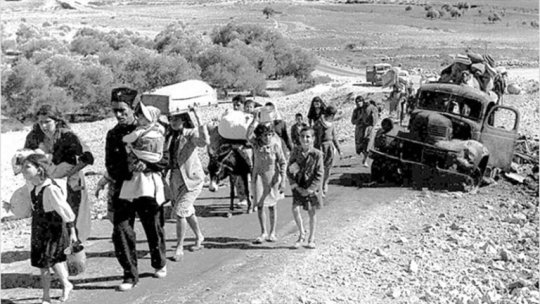
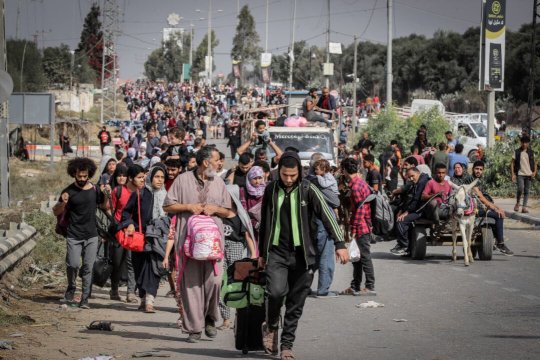
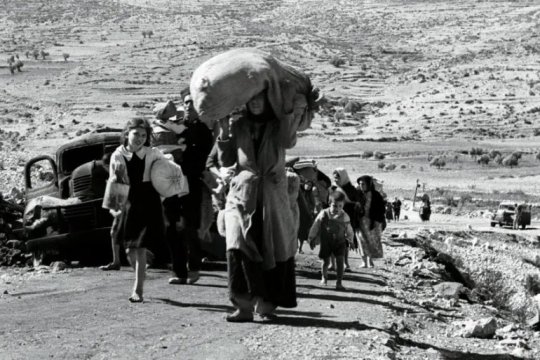
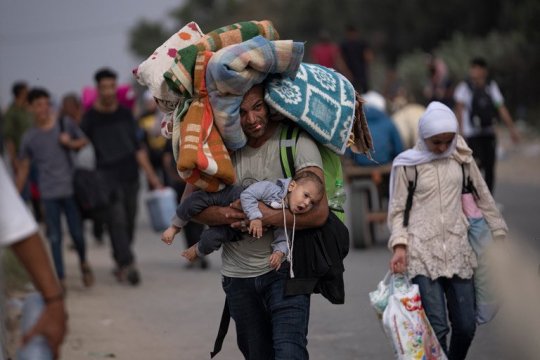
#from the river to the sea palestine will be free#boycott israel#pro palestine#gaza#news from the world#free palestine#boycott starbucks#boycott disney#boycott mcdonalds#palestine#nakba#nakba 1948#al nakba#the nakba never ended the colonizer lied#antizionism#palestinian history#genocide#nakba 2023
355 notes
·
View notes
Text
Today marks the 76th anniversary of the Nakba.
On such a day that holds so much sadness and anger and pain for any Palestinian anywhere in this world, we usually dedicate this day to learning more about our history and commemorating the stories of our loved ones who had witnessed the 1948 Nakba.
So on such a not so happy occasion, i’d like to recommend you a documentary that talks about the indigenous people of Ma’loul, a Palestinian village depopulated in 1948.
The documentary is called “Ma’loul Celebrates Its Destruction” by Michel Khleifi, and it follows Ma’loul’s past residents as they show us how they have their own special -and slightly bitter- way of commemorating this day and how they fight to hold onto their original hometown and roots, year after year, in the shadows of the occupation.
Please dedicate these few days to learn more about the history behind what we’re witnessing today
And remember that no one is free until we all are…
🕊️🤍🍉
#palestine#from the river to the sea palestine will be free#gaza#free gaza#gazaunderfire#save gaza#gaza strip#gazaunderattack#stand with gaza#free palestine 🇵🇸#documentaries#documentary#nakba#al nakba#nakba 1948#palestinian history#long live palestine#palestinian culture#palestine solidarity#palestinian art#palestina#palestinian lives matter#anti zionisim#end the occupation#end the apartheid#the nakba never ended the colonizer lied#nakba 2023#save palestine#stop palestinian genocide#stop the genocide
174 notes
·
View notes
Text
Nakba, the forced expulsion of a million Palestinians from their own land, marks the beginning of the tragedy for the Palestinians, who continue to suffer at the hands of the Israeli occupiers.
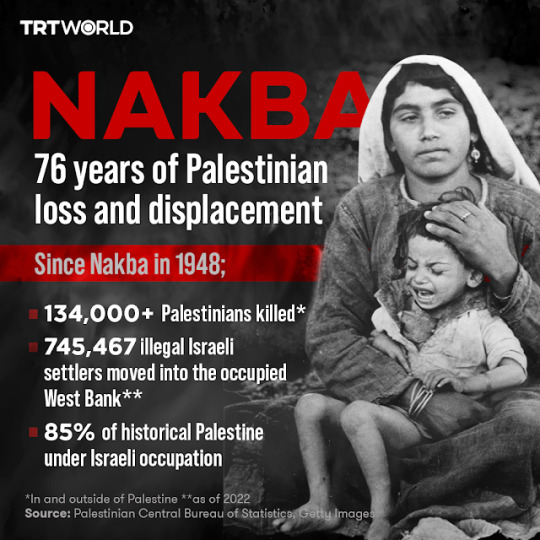
#nakba 1948#al nakba#nakba#nakba 2023#the nakba never ended the colonizer lied#antizionism#palestinian history#genocide#israel#free Palestine#free gaza#I stand with Palestine#Gaza#Palestine#Gazaunderattack#Palestinian Genocide#Gaza Genocide#end the occupation#Israel is an illegal occupier#Israel is committing genocide#Israel is committing war crimes#Israel is a terrorist state#Israel is a war criminal#Israel is an apartheid state#Israel is evil#Israeli war crimes#Israeli terrorism#IOF Terrorism#Israel kills babies#Israel kills children
34 notes
·
View notes
Text
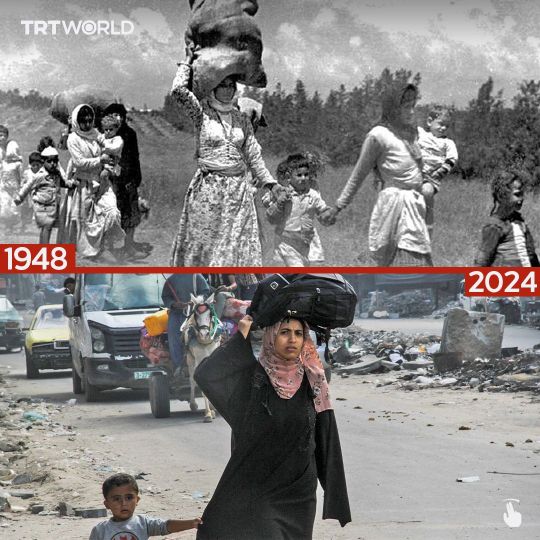
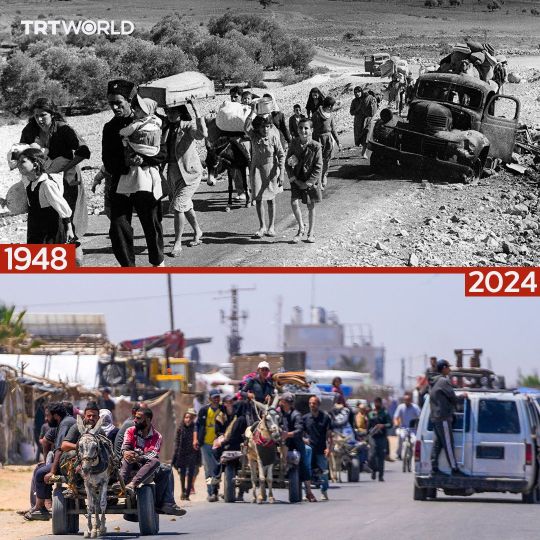
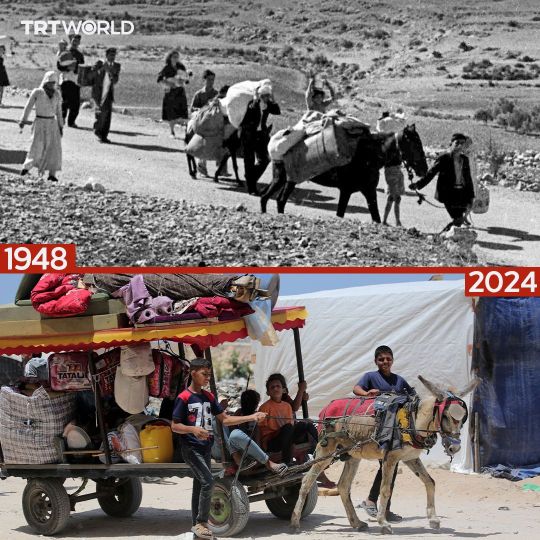
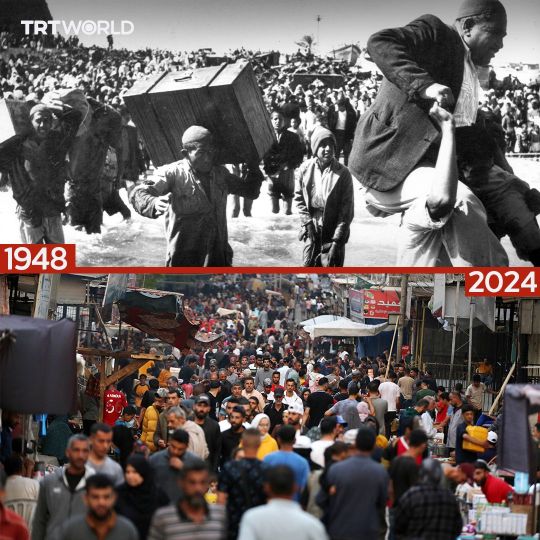
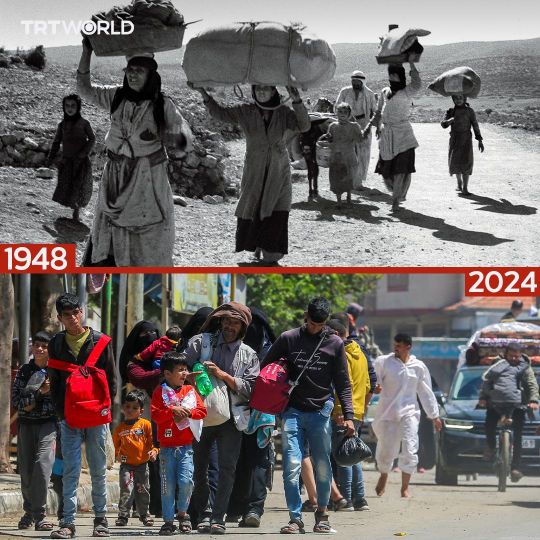
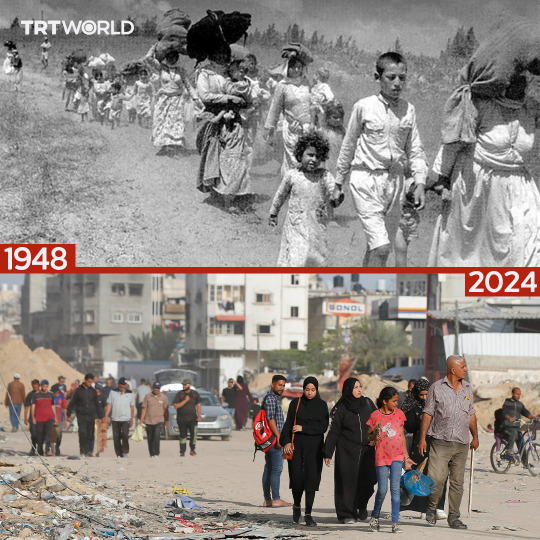
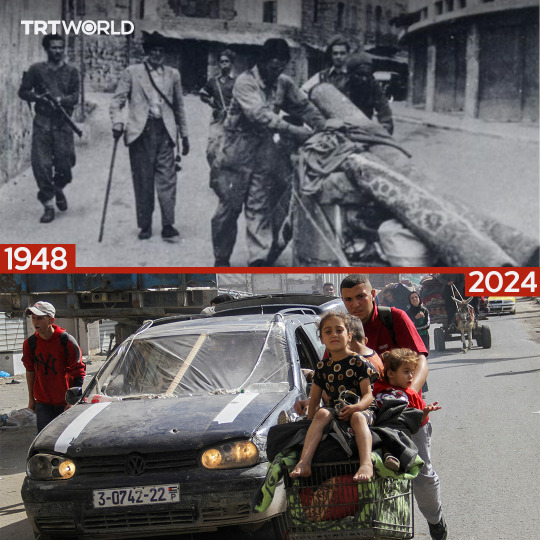
For 76 years, Palestinians have been violently dispossessed of their lands and forcibly displaced at the hands of illegal Jewish settlers, the Israeli army, and decades ago, Zionist paramilitaries.
The first mass displacement of Palestinians occurred in 1948 and is known as the Nakba, or ‘catastrophe’ in Arabic, and is commemorated on May 15, a day that coincides with the establishment of the State of Israel.
In the process of founding the Israeli state, violent Zionist militias expelled nearly 800,000 Palestinians from their native land through a campaign of murder, rape, and intimidation.
Following Hamas’s attack on October 7, 2023, brutal Israeli air strikes on Palestine’s Gaza have resulted in the mass internal displacement of nearly the entire population of the besieged enclave.
Since the beginning of its war on Gaza, Israel has heedlessly ordered the forced evacuation of Palestinians from areas all over the territory, pushing the population of 2.2 million into the enclave’s southern city of Rafah, labelling the city a “safe zone”.
Now, Israel has ordered residents out of the east of Rafah, and has since extended that order to central Rafah in recent days, sending nearly 300,000 Palestinians, most of whom have been displaced multiple times, fleeing for new shelters.
At the same time, Israeli forces have also re-entered the north of the enclave, which they previously claimed to have cleared of Hamas presence months ago. This renewed incursion has left Palestinians without secure shelters or basic necessities, compounding the widespread destruction seen across all corners of the enclave.
Here is a look at Palestinian displacement, past and present.
— TRT World on Facebook [x]
#palestine#gaza#free palestine#free gaza#nakba#النكبة#فلسطين#غزة#the west bank#news#politics#palestinian history#ethnic cleansing#genocide#israeli occupation
30 notes
·
View notes
Text
Whenever you see the word “Zionism” or “Zionists” just replace it with “ppl that think Jews have the right of self determination as if they are equal humans” and you will realize why we need to call this movement PalestiNazism.
“Look ! A Jew that think he can be our equal! Let’s demonize and dehumanize them ! How dare they think they deserve same rights we do ! “

#Israel#Palestine#all eyes on rafah#Rafah#Allah#Gaza#Hamas#resistance#genocide#palestinian history#PalestiNazims#justice#jumblr#jewish
20 notes
·
View notes
Text
17/12/23 this masterlist has been completely, vetted, revamped and reformatted with free access to all reading and viewing material. It will be updated and edited periodically so please click on my username and reblog the current version directly from me if you're able.
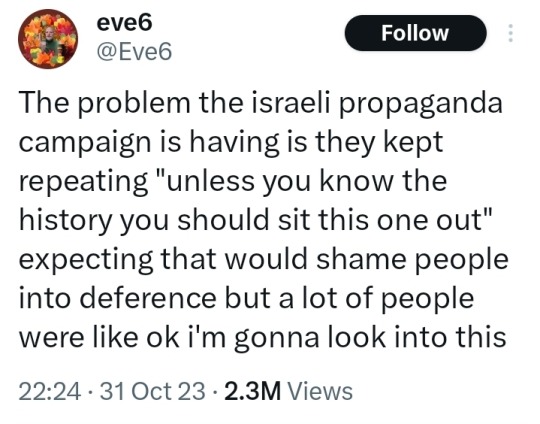
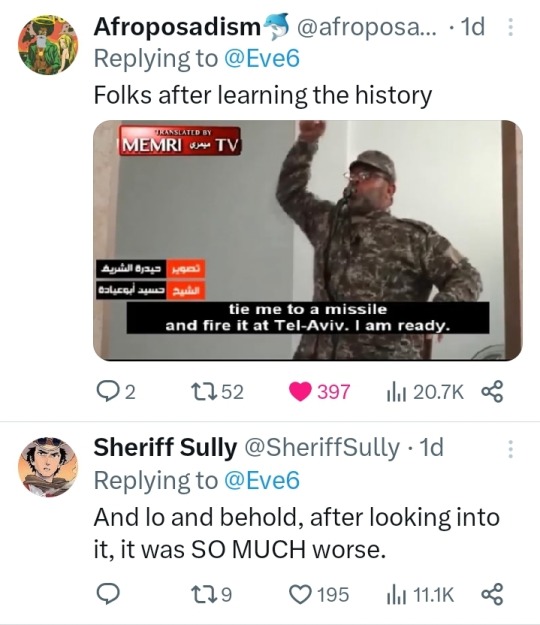

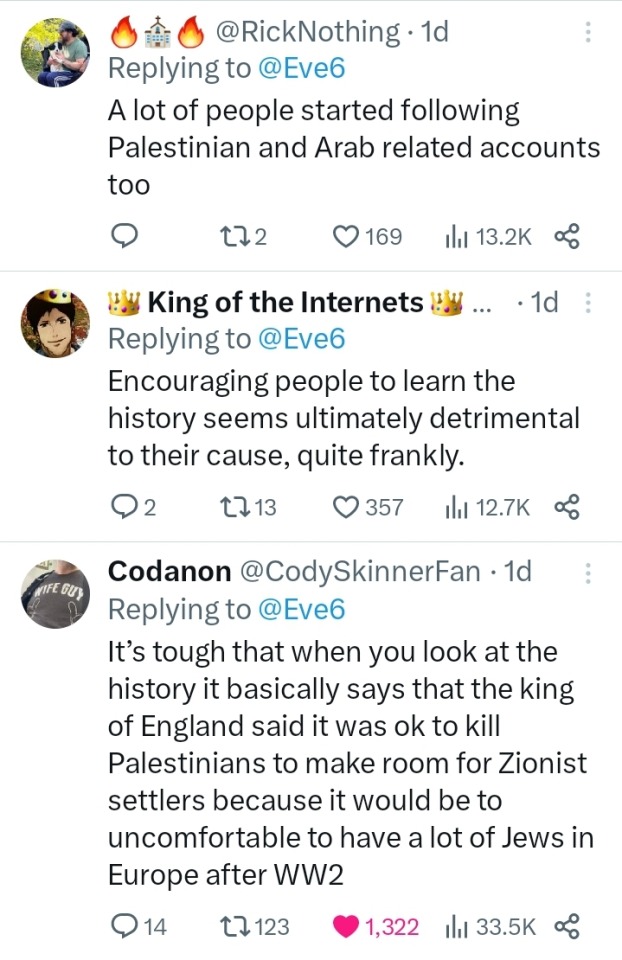
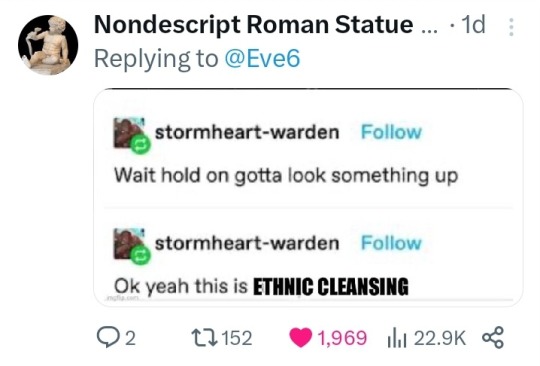
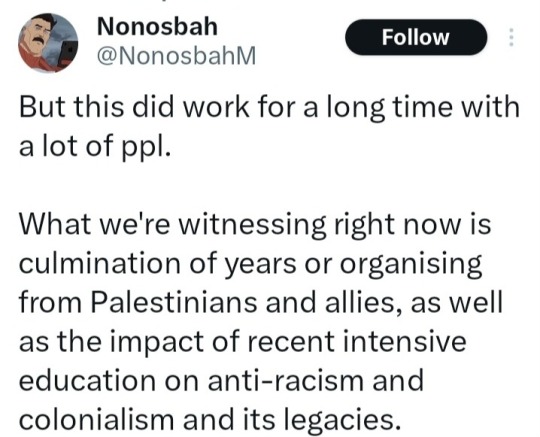
The Big Damn List Of Stuff They Said You Didn't Know
(Yes, it's a lot. Just choose your preferred medium and then pick one.)
Podcasts
Backgrounders and Quick Facts
Interactive Maps
Teach-Out Resources
Reading Material (free)
Films and Documentaries (free)
Non-Governmental Organizations
Social Media
How You Can Help
Podcasts
Cocktails & Capitalism: The Story of Palestine Part 1, Part 3
It Could Happen Here: The Cheapest Land is Bought with Blood, Part 2, The Balfour Declaration
Citations Needed: Media narratives and consent manufacturing around Israel-Palestine and the Gaza Siege
The Deprogram: Free Palestine, ft. decolonizatepalestine.com.
Backgrounders and Quick Facts
The Palestine Academy: Palestine 101
Institute for Middle East Understanding: Explainers and Quick Facts
Interactive Maps
Visualizing Palestine
Teach-Out Resources
1) Cambridge UCU and Pal Society
Palestine 101
Intro to Palestine Film + Art + Literature
Resources for Organising and Facilitating)
2) The Jadaliya YouTube Channel of the Arab Studies Institute
Gaza in Context Teach-in series
War on Palestine podcast
Updates and Discussions of news with co-editors Noura Erakat and Mouin Rabbani.
3) The Palestine Directory
History (virtual tours, digital archives, The Palestine Oral History Project, Documenting Palestine, Queering Palestine)
Cultural History (Palestine Open Maps, Overdue Books Zine, Palestine Poster Project)
Contemporary Voices in the Arts
Get Involved: NGOs and campaigns to help and support.
3) PalQuest Interactive Encyclopedia of the Palestine Question.
4) The Palestine Remix by Al Jazeera
Books and Articles
Free reading material
My Gdrive of Palestine/Decolonization Literature (nearly all the books recommended below + books from other recommended lists)
Five free eBooks by Verso
Three Free eBooks on Palestine by Haymarket
LGBT Activist Scott Long's Google Drive of Palestine Freedom Struggle Resources
Recommended Reading List
Academic Books
Edward Said (1979) The Question of Palestine, Random House
Ilan Pappé (2002)(ed) The Israel/Palestine Question, Routledge
Ilan Pappé (2006) The Ethnic Cleansing of Palestine, OneWorld Publications
Ilan Pappé (2011) The Forgotten Palestinians: A History of the Palestinians in Israel, Yale University Press
Ilan Pappé (2015) The Idea of Israel: A History of Power and Knowledge, Verso Books
Ilan Pappé (2017) The Biggest Prison On Earth: A History Of The Occupied Territories, OneWorld Publications
Ilan Pappé (2022) A History of Modern Palestine, Cambridge University Press
Rosemary Sayigh (2007) The Palestinians: From Peasants to Revolutionaries, Bloomsbury
Andrew Ross (2019) Stone Men: the Palestinians who Built Israel, Verso Books
Rashid Khalidi (2020) The Hundred Years’ War on Palestine: A History of Settler Colonialism and Resistance 1917–2017
Ariella Azoulay (2011) From Palestine to Israel: A Photographic Record of Destruction and State Formation, 1947-1950, Pluto Press
Ariella Azoulay and Adi Ophir (2012) The One-State Condition: Occupation and Democracy in Israel/Palestine, Stanford University Press.
Jeff Halper (2010) An Israeli in Palestine: Resisting Dispossession, Redeeming Israel, Pluto Press
Jeff Halper (2015) War Against the People: Israel, the Palestinians and Global Pacification
Jeff Halper (2021) Decolonizing Israel, Liberating Palestine: Zionism, Settler Colonialism, and the Case for One Democratic State, Pluto Press
Anthony Loewenstein (2023) The Palestine Laboratory: How Israel exports the Technology of Occupation around the World
Noura Erakat (2019) Justice for Some: Law and the Question of Palestine, Stanford University Press
Neve Gordon (2008) Israel’s Occupation, University of California Press
Joseph Massad (2006) The Persistence of the Palestinian Question: Essays on Zionism and the Palestinians, Routledge
Memoirs
Edward Said (1986) After the Last Sky: Palestine Lives, Columbia University PEdward Saidress
Edward Said (2000) Out of Place; A Memoir, First Vintage Books
Mourid Barghouti (2005) I saw Ramallah, Bloomsbury
Hatim Kanaaneh (2008) A Doctor in Galilee: The Life and Struggle of a Palestinian in Israel, Pluto Press
Raja Shehadeh (2008) Palestinian Walks: Into a Vanishing Landscape, Profile Books
Ghada Karmi (2009) In Search of Fatima: A Palestinian Story, Verso Books
Vittorio Arrigoni (2010) Gaza Stay Human, Kube Publishing
Ramzy Baroud (2010) My Father Was a Freedom Fighter: Gaza's Untold Story, Pluto Press
Izzeldin Abuelaish (2011) I Shall Not Hate: A Gaza Doctor’s Journey on the Road to Peace and Human Dignity, Bloomsbury
Atef Abu Saif (2015) The Drone Eats with Me: A Gaza Diary, Beacon Press
Anthologies
Voices from Gaza - Insaniyyat (The Society of Palestinian Anthropologists)
Letters From Gaza • Protean Magazine
Salma Khadra Jayyusi (1992) Anthology of Modern Palestinian Literature, Columbia University Press
ASHTAR Theatre (2010) The Gaza Monologues
Refaat Alreer (ed) (2014) Gaza Writes Back, Just World Books
Refaat Alreer, Laila El-Haddad (eds) (2015) Gaza Unsilenced, Just World Books
Cate Malek and Mateo Hoke (eds)(2015) Palestine Speaks: Narrative of Life under Occupation, Verso Books
Jehad Abusalim, Jennifer Bing (eds) (2022) Light in Gaza: Writings Born of Fire, Haymarket Books
Short Story Collections
Ghassan Kanafani, Hilary Kilpatrick (trans) (1968) Men in the Sun and Other Palestinian Stories, Lynne Rienner Publishers
Ghassan Kanafani, Barbara Harlow, Karen E. Riley (trans) (2000) Palestine’s Children: Returning to Haifa and Other Stories, Lynne Rienner Publishers
Atef Abu Saif (2014) The Book of Gaza: A City in Short Fiction, Comma Press
Samira Azzam, Ranya Abdelrahman (trans) (2022) Out Of Time: The Collected Short Stories of Samira Azzam
Sonia Sulaiman (2023) Muneera and the Moon; Stories Inspired by Palestinian Folklore
Essay Collections
Edward W. Said (2000) Reflections on Exile and Other Essays, Harvard University Press
Salim Tamari (2008) Mountain against the Sea: Essays on Palestinian Society and Culture, University of California Press
Fatma Kassem (2011) Palestinian Women: Narratives, histories and gendered memory, Bloombsbury
Ramzy Baroud (2019) These Chains Will Be Broken: Palestinian Stories of Struggle and Defiance in Israeli Prisons, Clarity Press
Novels
Sahar Khalifeh (1976) Wild Thorns, Saqi Books
Liyana Badr (1993) A Balcony over the Fakihani, Interlink Books
Hala Alyan (2017) Salt Houses, Harper Books
Susan Abulhawa (2011) Mornings in Jenin, Bloomsbury
Susan Abulhawa (2020) Against the Loveless World, Bloomsbury
Graphic novels
Joe Sacco (2001) Palestine
Joe Sacco (2010) Footnotes in Gaza
Naji al-Ali (2009) A Child in Palestine, Verso Books
Mohammad Sabaaneh (2021) Power Born of Dreams: My Story is Palestine, Street Noise Book*
Poetry
Fady Joudah (2008) The Earth in the Attic, Sheridan Books,
Ghassan Zaqtan, Fady Joudah (trans) (2012) Like a Straw Bird It Follows Me and Other Poems, Yale University Press
Hala Alyan (2013) Atrium: Poems, Three Rooms Press*
Mohammed El-Kurd (2021) Rifqa, Haymarket Books
Mosab Abu Toha (2022) Things You May Find Hidden in My Ear: Poems from Gaza, City Lights Publishers
Tawfiq Zayyad (2023) We Are Here to Stay, Smokestack Books*
The Works of Mahmoud Darwish
Poems
Rafeef Ziadah (2011) We Teach Life, Sir
Nasser Rabah (2022) In the Endless War
Refaat Alareer (2011) If I Must Die
Hiba Abu Nada (2023) I Grant You Refuge/ Not Just Passing
[All books except the ones starred are available in my gdrive. I'm adding more each day. But please try and buy whatever you're able or borrow from the library. Most should be available in the discounted Free Palestine Reading List by Pluto Press, Verso and Haymarket Books.]
Human Rights Reports & Documents
Information on current International Court of Justice case on ‘Legal Consequences arising from the Policies and Practices of Israel in the Occupied Palestinian Territory, including East Jerusalem’
UN Commission of Inquiry Report 2022
UN Special Rapporteur Report on Apartheid 2022
Amnesty International Report on Apartheid 2022
Human Rights Watch Report on Apartheid 2021
Report of the United Nations Fact-Finding Mission on the Gaza Conflict’ 2009 (‘The Goldstone Report’)
Advisory Opinion on the Legal Consequences of the Construction of a Wall in the Occupied Palestinian Territory, International Court of Justice, 9 July 2004
Films
Documentaries
Jenin, Jenin (2003) dir. Mohammed Bakri
Massacre (2005) dir. Monica Borgmann, Lokman Slim, Hermann Theissen
Slingshot HipHop (2008) dir. Jackie Reem Salloum
Waltz with Bashir (2008) dir. Ari Folman † (also on Amazon Prime)
Tears of Gaza (2010) dir. Vibeke Løkkeberg (also on Amazon Prime)
5 Broken Cameras (2011) dir. Emad Burnat (also on Amazon Prime)
The Gatekeepers (2012) dir. Dror Moreh (also on Amazon Prime)
The Great Book Robbery (2012) | Al Jazeera English
Al Nakba (2013) | Al Jazeera (5-episode docu-series)
The Village Under the Forest (2013) dir. Mark J. Kaplan
Where Should The Birds Fly (2013) dir. Fida Qishta
Naila and the Uprising (2017) (also on Amazon Prime)
GAZA (2019) dir. Andrew McConnell and Garry Keane
Gaza Fights For Freedom (2019) dir. Abby Martin
Little Palestine: Diary Of A Siege (2021) dir. Abdallah Al Khatib
Palestine 1920: The Other Side of the Palestinian Story (2021) | Al Jazeera World Documentary
Gaza Fights Back (2021) | MintPress News Original Documentary | dir. Dan Cohen
Innocence (2022) dir. Guy Davidi
Short Films
Fatenah (2009) dir. Ahmad Habash
Gaza-London (2009) dir. Dina Hamdan
Condom Lead (2013) dir. Tarzan Nasser, Arab Nasser
OBAIDA (2019) | Defence for Children Palestine
Theatrical Films
Divine Intervention (2002) | dir. Elia Suleiman (also on Netflix)
Paradise Now (2005) dir Hany Abu-Assad (also on Amazon Prime)
Lemon Tree (2008) (choose auto translate for English subs) (also on Amazon Prime)
It Must Be Heaven (2009) | dir. Elia Suleiman †
The Promise (2010) mini-series dir. Peter Kosminsky (Part 1, Part 2, Part 3, Part 4)
Habibi (2011)* dir. Susan Youssef
Omar (2013)* dir. Hany Abu-Assad †
3000 Nights (2015)* dir. Mai Masri
Foxtrot (2017) dir. Samuel Maoz (also on Amazon Prime)
The Time that Remains (2019) dir. Elia Suleiman †
Gaza Mon Amour (2020) dir. Tarzan Nasser, Arab Nasser †
The Viewing Booth (2020) dir. Ra'anan Alexandrowicz (on Amazon Prime and Apple TV)
Farha (2021)* | dir. Darin J. Sallam
Palestine Film Institute Archive
All links are for free viewing. The ones marked with a star (*) can be found on Netflix, while the ones marked † can be downloaded for free from my Mega account.
If you find Guy Davidi's Innocence anywhere please let me know, I can't find it for streaming or download even to rent or buy.
In 2018, BDS urged Netflix to dump Fauda, a series created by former members of IOF death squads that legitimizes and promotes racist violence and war crimes, to no avail. Please warn others to not give this series any views. BDS has not called for a boycott of Netflix. ]
NGOs
The Boycott, Divestment, Sanctions (BDS) Movement
Medical Aid for Palestinians
Euro-Mediterranean Human Rights Monitor
Palestine Defence for Children International
Palestinian Feminist Collective
Al-Shabaka: The Palestinian Policy Network
Addameer Prisoner Support and Human Rights Association
Institute for Palestine Studies
Al Haq
Artists for Palestine
The Palestine Museum
Jewish Currents
B’Tselem
DAWN
Social Media
Palestnians on Tumblr
@el-shab-hussein
@killyfromblame
@apollos-olives
@fairuzfan
@palipunk
@sar-soor
@nabulsi
@ibtisams
@wearenotjustnumbers2
@90-ghost (is in Gaza right now. Please donate to his GFM and boost it.)
@tamarrud
Allies and advocates (not Palestinian)
@bloglikeanegyptian beautiful posts that read like op-eds
@vyorei daily news roundups
@luthienne resistance through prose
@decolonize-the-left scoop on the US political plans and impacts
@feluka
(Please don't expect any of these blogs to be completely devoted to Palestine allyship; they do post regularly about it but they're still personal blogs and post whatever else they feel like. Do not harrass them.)
Gaza journalists
Motaz Azaiza IG: @motaz_azaiza | Twitter: @azaizamotaz9 | TikTok: _motaz.azaiza (left Gaza as of Jan 23)
Bisan Owda IG and TikTok: wizard_bisan1 | Twitter: @wizardbisan
Saleh Aljafarawi IG: @saleh_aljafarawi | Twitter: @S_Aljafarawi | TikTok: @saleh_aljafarawi97
Plestia Alaqad IG: @byplestia | TikTok: @plestiaaqad (left Gaza)
Wael Al-Dahdouh IG: @wael_eldahdouh | Twitter: @WaelDahdouh (left Gaza as of Jan 13)
Hind Khoudary IG: @hindkhoudary | Twitter: @Hind_Gaza
Ismail Jood IG and TikTok: @ismail.jood (announced end of coverage on Jan 25)
Yara Eid IG: @eid_yara | Twitter: @yaraeid_
Eye on Palestine IG: @eye.on.palestine | Twitter: @EyeonPalestine | TikTok: @eyes.on.palestine
Muhammad Shehada Twitter: @muhammadshehad2
(Edit: even though some journos have evacuated, the footage up to the end of their reporting is up on their social media, and they're also doing urgent fundraisers to get their families and friends to safety. Please donate or share their posts.)
News organisations
The Electronic Intifada Twitter: @intifada | IG: @electronicintifada
Quds News Network Twitter and Telegram: @QudsNen | IG: @qudsn (Arabic)
Times of Gaza IG: @timesofgaza | Twitter: @Timesofgaza | Telegram: @TIMESOFGAZA
The Palestine Chronicle Twitter: @PalestineChron | IG: @palestinechron | @palestinechronicle
Al-Jazeera Twitter: @AJEnglish | IG and TikTok: @aljazeeraenglish, @ajplus
Middle East Eye IG and TikTok: @middleeasteye | Twitter: @MiddleEastEye
Democracy Now Twitter and IG: @democracynow TikTok: @democracynow.org
Mondoweiss IG and TikTok: @mondoweiss | Twitter: @Mondoweiss
The Intercept Twitter and IG: @theintercept
MintPress Twitter: @MintPressNews | IG: mintpress
Novara Media Twitter and IG: @novaramedia
Truthout Twitter and IG: @truthout
Palestnians on Other Social Media
Mouin Rabbani: Middle East analyst specializing in the Arab-Israeli conflict and Palestinian affairs. Twitter: @MouinRabbani
Noura Erakat: Legal scholar, human rights attorney, specialising in Israeli–Palestinian conflict. Twitter: @4noura | IG: @nouraerakat | (http://www.nouraerakat.com/)
Hebh Jamal: Journalist in Germany. IG and Twitter: @hebh_jamal
Ghada Sasa: PhD candidate in International Relations, green colonialism, and Islam in Canada. Twitter: @sasa_ghada | IG: @ghadasasa48
Taleed El Sabawi: Assistant professor of law and researcher in public health. Twitter: @el_sabawi | IG
Lexi Alexander: Filmmaker and activist. Twitter: @LexiAlex | IG: @lexialexander1
Mariam Barghouti: Writer, blogger, researcher, and journalist. Twitter: @MariamBarghouti | IG: @mariambarghouti
Rasha Abdulhadi: Queer poet, author and cultural organizer. Twitter: @rashaabdulhadi
Mohammed el-Kurd: Writer and activist from Jerusalem. IG: @mohammedelkurd | Twitter: @m7mdkurd
Ramy Abdu: Founder and Chairman of the Euro-Mediterranean Human Rights Monitor. Twitter: @RamyAbdu
Subhi: Founder of The Palestine Academy website. IG: @sbeih.jpg |TikTok @iamsbeih | Twitter: @iamsbeih
Allies
Lowkey (Kareem Dennis): Rapper, activist, video and podcast host for MintPress. Twitter: @LowkeyOnline IG: @lowkeyonline
Francesca Albanese: UN Special Rapporteur on the Occupied Territories. Twitter: @FranceskAlbs
Sana Saeed: Journalist and media critic, host and senior producer at Al-Jazeera Plus. IG: @sanaface | Twitter: @SanaSaeed
Shailja Patel: Poet, playwright, activist, founding member of Kenyans For Peace, Truth and Justice. Twitter: @shailjapatel
Jairo I. Fúnez-Flores: Researcher in curriculum studies, decolonial theory, social movements. Twitter: @Jairo_I_Funez
Jack Dodson: Journalist and Filmmaker. Twitter: @JackDodson IG: @jdodson4
Imani Barbarin: Writer, public speaker, and disability rights activist. IG: @crutches_and_spice | Twitter: @Imani_Barbarin | TikTok: @crutches_and_spice
Jewish Allies
Katie Halper: US comedian, writer, filmmaker, podcaster, and political commentator. IG and Twitter: @kthalps
Amanda Gelender: Writer. Twitter: @agelender | (https://agelender.medium.com/)
Yoav Litvin: Jerusalem-born Writer and Photographer. IG and Twitter: @nookyelur | (yoavlitvin.com)
Alana Lentin: Professor of Cultural and Social Analysis at Western Sydney University. Twitter: @alanalentin
Gideon Levy: anti-Zionist Israeli journalist and activist. Twitter: @gideonle
How You Can Help Palestine
How to be an Ally 101
📢: Global Strike Guide
If any links are broken let me know. Or pull up the current post to check whether it's fixed.
"Knowledge is Israel's worst enemy. Awareness is Israel's most hated and feared foe. That's why Israel bombs a university: it wants to kill openness and determination to refuse living under injustice and racism."
— Dr. Refaat Alareer, (martyred Dec 6, 2023)
From River To The Sea Palestine Will Be Free 🇵🇸🇵🇸🇵🇸
-----
Edit 1: took the first video down because turns out the animator is a terf and it links to her blog. Really sorry for any distress.
Edit 2: All recommended readings + Haymarket recommendations + essential decolonization texts have been uploaded to my linked gdrive. I will adding more periodically. Please do buy or check them out from the library if possible, but this post was made for and by poor and gatekept Global South bitches like me.
Some have complained about the memes being disrespectful. You're actually legally obligated to make fun of Israeli propaganda and Zionists. I don't make the rules.
Edit 3: "The river to the sea" does not mean the expulsion of Jews from Palestine. Believing that is genocide apologia.
Edit 4: Gazans have specifically asked us to put every effort into pushing for a ceasefire instead of donations. "Raising humanitarian aid" is a grift Western governments are pushing right now to deflect from the fact that they're sending billions to Israel to keep carpet bombing Gazans. As long as the blockades are still in place there will never be enough aid for two million people. (UPDATE: PLEASE DONATE to the Gazan's GoFundMe fundraisers to help them buy food and get out of Rafah into Egypt. E-SIMs, food and medical supplies are also essential. Please donate to the orgs linked in the How You Can Help. Go on the strikes. DO NOT STOP PROTESTING.)
Edit 5: Google drive link for academic books folder has been fixed. Also have added a ton of resources to all the other folders so please check them out.
Edit 6: Added interactive maps, Jadaliya channel, and masterlists of donation links and protest support and of factsheets.
Edit 7: Complete reformatting
The twitter accounts I reposted as it was given to me and I just now realized it had too many Israeli voices and almost none of the Palestinians I'm following, so it's being edited. (Update: done!) also removed sources like Jewish Voices of Peace and Breaking the Silence that do good work but have come under fair criticism from Palestinians.
Edit 8: Complete revamping of the social media section. It now reflects my own following list.
Edit 9: removed some more problematic people from the allies list. Remember that the 2SS is a grift that's used to normalize violence and occupation, kids. Supporting the one-state solution is lowest possible bar for allyship. It's "Free Palestine" not "Free half of Palestine and hope Israel doesn't go right back to killing them".
Edit 10: added The Palestine Directory + Al Jazeera documentary + Addameer. This "100 links per post" thing sucks.
Edit 11: more documentaries and films
Edit 12: reformatted reading list
Edit 13: had to remove @palipunk's masterlist to add another podcast. It's their pinned post and has more resources Palestinian culture and crafts if you want to check it out
Edit 14 6th May '24: I've stopped updating this masterlist so some things, like journalists still left in Gaza and how to support the student protests are missing. I've had to take a step back and am no longer able to track these things down on my own, and I've hit the '100 links per post' limit, but if you can leave suggestions for updates along with links in either the replies or my asks I will try and add them.
#free palestine#palestine resources#palestine reading list#decolonization#israel palestine conflict#israel palestine war#british empire#american imperialism#apartheid#social justice#middle east history#MENA#arab history#anti zionism#palestinian art#palestinian history#palestinian culture#palestinian genocide#al nakba#ethnic cleansing#war crimes#racism#imperialism#colonialism#british colonialism#knee of huss#ask to tag#Youtube
78K notes
·
View notes
Text
Please consider spending time to learn more about Afro-Palestinian experiences and living under occupation while Black and Palestinian, along with Afro-Palestinian resistance efforts throughout the years. Here are some valuable articles and resources:
Articles:
In the heart of the Old City, generations of Afro-Palestinians persevere in the face of occupation by Mousa Qous
Putting the pieces together: Fragments of oral history in exile by Samah Fadil
‘Afro-Palestinians’ forge a unique identity in Israel by Isma'il Kushkush
The Africans of Jerusalem by Mousa Qous
The History Of Afro-Palestinians, Past And Present by Fayida Jailler
African-Palestinian community’s deep roots in liberation struggle by Electronic Intifada
Remembering Fatima Bernawi: Historic Palestinian fighter and liberated prisoner (1939-2022) on Samidoun
Fatima Barnawi, founder of Palestinian Women's Police and veteran prisoner, dies at 83 by Middle East Eye
On Fatima Bernawi, Women's Struggle, and Black-Palestinian Solidarity by Elom Tettey-Tamaklo
Afro Palestine: the African Diaspora in Palestine (not an article but a quick video summary of Afro-Palestinian history)
Note: highly recommend checking out Mousa Qous, the founder of the African Community Society, for his writings above all!
African Community Society of Jerusalem:
Their website— organization centered around the Afro-Palestinian community in Jerusalem.
General info about the group
ACS's instagram to learn more about Afro-Palestinian history.
Here is a write-up about the African Community Society, their impact within Palestinian society, and Afro-Palestinian history in Jerusalem specifically. Highly recommend taking the time to read this if you can.
Please take the time to watch this Documentary by Stephen Graham about former Israeli prisoner Ali Jiddah where he takes the viewer on a tour throughout Jerusalem and describes the unique struggles the Afro-Palestinian community face. He is quite a friendly guy and very funny:
youtube
#palestine#palestinian history#palestine history#palestina#stand with palestine#i'll probably add more links as i come across them#Youtube
13K notes
·
View notes
Text
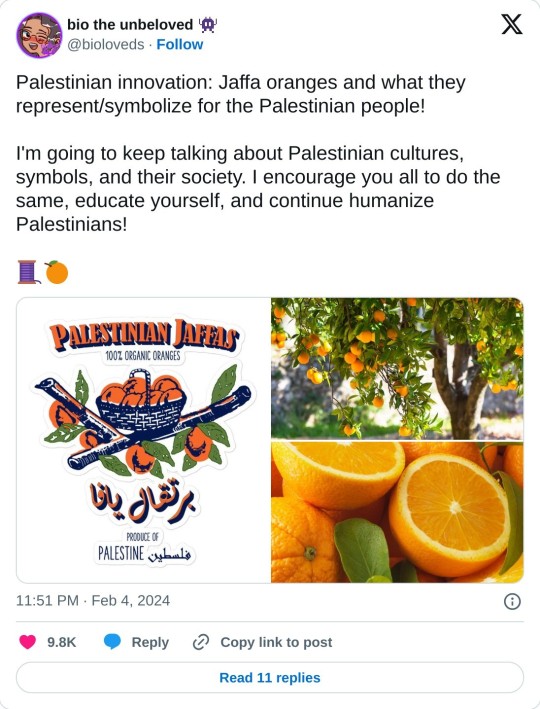

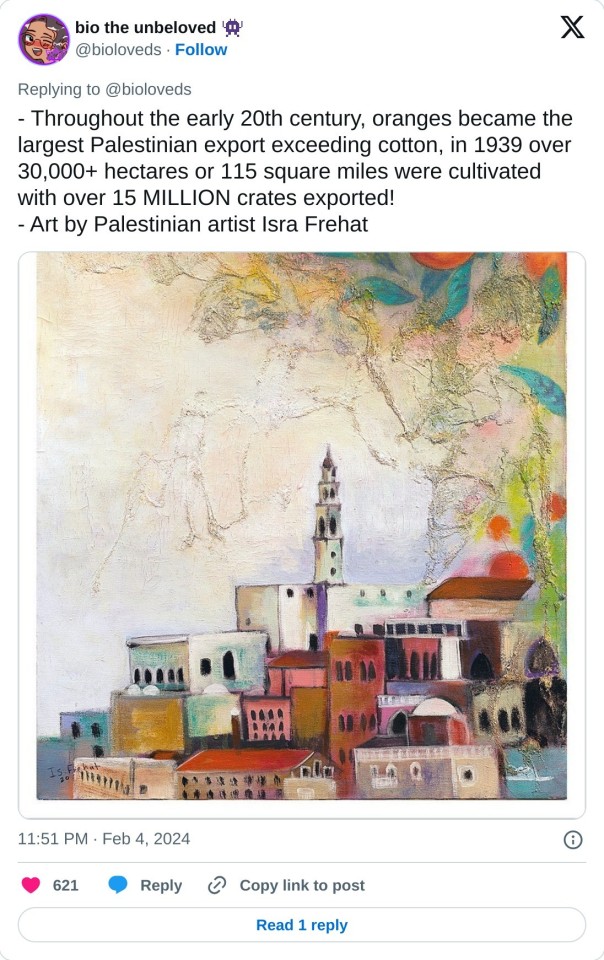


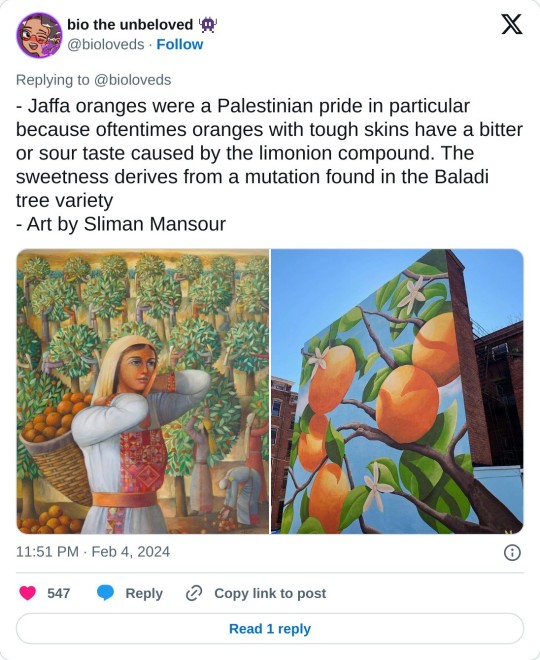
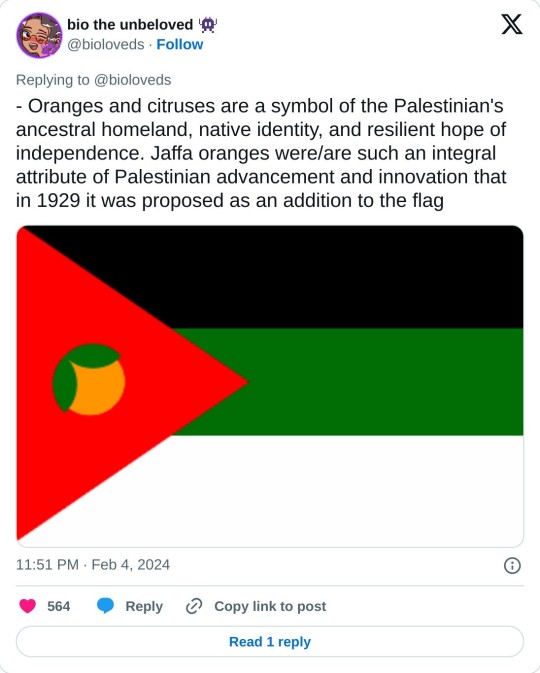

#feminist#social justice#palestinian art#palestine#free palestine#jaffa oranges#palestinian history#palestinian artist#palestinian liberation#history#art#palestinian culture#free gaza#freepalastine🇵🇸
7K notes
·
View notes
Text
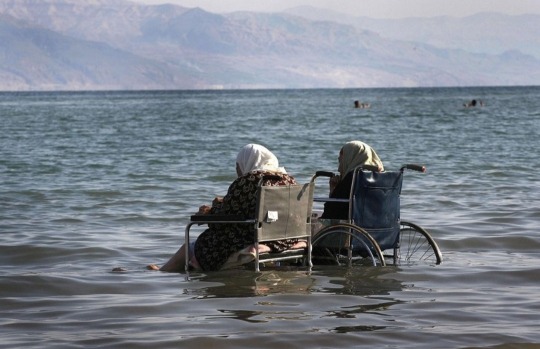
Elderly Palestinian women sit in wheelchairs as they enjoy the waters of the northern part of the Dead Sea in West Bank, Palestine. Photographed by Menahem Kahana, 2008.
#menahem kahana#palestine#palestinian history#west bank#dead sea#street photography#portrait photography#ph#from the river to the sea palestine will be free
10K notes
·
View notes
Text
Keep talking about Gaza.
Keep talking about Palestine.
Keep talking about Palestinian martyrs.
Keep talking about Palestinian survivors.
Keep talking about Palestinian children.
Keep talking about war crimes.
Keep talking about genocide.
Keep talking about colonialism.
Keep talking about forced starvation.
Keep talking about forced adoption.
Keep talking about Israeli occupation.
Keep talking about the Nakba of 1948.
KEEP TALKING ABOUT WHAT IS HAPPENING TO PALESTINE
Keep boosting Palestinian history.
Keep boosting Palestinian graphics.
Keep boosting Palestinian poetry.
Keep boosting Palestinian fashion.
Keep boosting Palestinian textiles.
Keep boosting Palestinian art.
Keep boosting Palestinian culture.
Keep boosting Palestinian values.
Keep boosting Palestinian stories.
Keep boosting Palestinian voices.
Keep boosting Palestinian life.
Keep boosting Palestinian loss.
Keep boosting Palestinian love.
Keep boosting Palestinian grief.
Keep boosting Palestinian hope.
KEEP BOOSTING PALESTINIAN HUMANITY
#free palestine#anti genocide#jews for palestine#free gaza#gaza genocide#palestine will be free#boycott divest sanction#end israeli occupation#jewish antizionism#anti zionisim#anti colonialism#anti colonization#palestinian art#palestinian history#palestine art#palestine news#gaza art#indigenous art#indigenous rights#indigenous culture#palestinian children#free palestine art#palestinian artist#palestinian fashion#palestinian poetry#palestinian writers
1K notes
·
View notes
Text
"...in 1948 "israel" had not only expelled the Palestinians from their country but also frozen all their bank assets. Not content with depriving the Palestinians of their homes and taking over their country, "israel" was also pursuing them across the border and depriving them of the means to live in the countries where they were exiled. "Israeli" officials were working on the principle of "no money, no country." They wanted to turn the Palestinians into beggars."
-Raja Shehadeh, "We Could Have Been Friends, My Father and I"
#free palestine#free gaza#i stand with palestine#raja shehadeh#palestinian literature#palestinian history#genocide#zionism is terrorism#colonialism#capitalism
1K notes
·
View notes
Text
Someone on Reddit made the mistake of saying, "Teach me how this conflict came about" where I could see it.
Let me teach you too.
The common perception is that Jews came out of nowhere, stole Palestinian homes and kicked Palestinians out of them, and then bombed them for 75 years, until they finally rebelled in the form of Hamas invading Israel and massacring 22 towns in one day.
The historical reality is that Jews have lived there continuously for at least 3500 years.
There are areas, like Meggido iirc, with archeological evidence of continuous habitation for 7,000 years, but Jewish culture as we recognize it today didn't develop until probably halfway through that.
Ethnic Jews are the indigenous people of this area.
Indigeneity means a group was originally there, before any colonization happened, and that it has retained a cultural connection to the land. History plus culture.
That's what Jews have: even when the diaspora became larger than the number of Jews in Israel, the yearning to return to that homeland was a daily part of Jewish prayer and ritual.
The Jewish community in Israel was crushed pretty violently by the Roman Empire in 135 CE, but it was still substantial, sometimes even the majority population there, for almost a thousand years.
The 600s CE brought the advent of Islam and the Arab Empire, expanding out from Saudi Arabia into Israel and beyond. It was largely a region where Jews were second-class citizens. But it was still WAY better than the way Christian Europe treated Jews.
From the 700s-900s, the area saw repeated civil wars, plagues, and earthquakes.
Then the Crusades came, with waves of Christians making "pilgrimages to the Holy Land" and trying to conquer it from Muslims and Jews, who they slaughtered and enslaved.
Israel became pretty well depopulated after all that. It was a very rough time to live there. (And for the curious, I'm calling it Israel because that's what it had been for centuries, until the Romans erased the name and the country.)
By the 1800s, the TOTAL population of what's now Israel and Palestine had varied from 150,000 - 275,000 for centuries. It was very rural, very sparsely populated, on top of being mostly desert.
In the 1880s, Jews started buying land and moving back to their indigenous homeland. As tends to happen, immigration brought new projects and opportunities, which led to more immigration - not only from Jews, but from the Arab world as well.
Unfortunately, there was an antisemitic minority spearheaded by Amin al-Husseini. Who was very well-connected, rich, and from a politically powerful family.
Al-Husseini had enthusiastically participated in the Armenian Genocide under the Ottoman Empire. Then the Empire fell in World War One, and the League of Nations had to figure out what to do with its land.
Mostly, if an area was essentially operating as a country (e.g. Turkey), the League of Nations let it be one. In areas that weren't ready for self-rule, it appointed France or Britain to help them get there.
In recognition of the increased Jewish population in their traditional, indigenous homeland, it declared that that homeland would again become Israel.
As in, the region was casually called Palestine because that was the lay term for "the Holy Land." It had not been a country since Israel was stamped out; only a region of a series of different empires. And the Mandate For Palestine said it was establishing "a national home of the Jewish people" there, in recognition of "the historical connection of the Jewish people with Palestine and to the grounds for reconstituting their national home in that country."
Britain was appointed to help the Arab and Jewish communities there develop systems of self-government, and then to work together to govern the region overall.
At least, that was the plan.
Al-Husseini, who was deeply antisemitic, did not like this plan.
And, extra-unfortunately, the British response to al-Husseini inciting violent anti-Jewish riots was to put him in a leadership role over Arab Palestine.
They thought it would calm him down and perhaps satisfy him.
They were very wrong.
He went on to become a huge Hitler fanboy, and then a Nazi war criminal. He co-created the Muslim Brotherhood - which Hamas is part of - with fellow fascist fanboy Hassan al-Banna.
He got Nazi Party funding for armed Muslim Brotherhood militias to attack Jews and the Brits in the late 30s, convincing Britain to agree to limit Jewish immigration at the time when it was most desperately needed.
He started using the militias again in 1947, when the United Nations voted to divide the mandated land into a Jewish homeland and a Palestinian one.
Al-Husseini wouldn't stand for a two-state solution. He was determined to tolerate no more than the subdued, small Jewish minority of second-class citizens that he remembered from his childhood.
As armed militias increasingly ran riot, the Arab middle and upper classes increasingly left. About 100,000 left the country before May 1948, when Britain was to pull out, leaving Israel and Palestine to declare their independence.
The surrounding nations didn't want war. They largely accepted the two-state solution.
But al-Husseini lobbied HARD. And by mobilizing the Muslim Brotherhood to provide "destabilizing mass demonstrations and a murderous campaign of intimidation," he got the Arab League nations to agree to invade, en masse, as soon as Britain left.
About 600,000 Arabs fled to those countries during the ensuing war.
Jews couldn't seek refuge there; in fact, most of those countries either exiled their Jews directly, confiscating their property first, or else made Jewish life unlivable and exploited them for underpaid or slave labor for years first.
By the time the smoke cleared and a peace treaty was signed, most of the Arab Palestinian community had fled; there was no Arab Palestinian leadership; many of the refugees' homes and businesses had left had been destroyed in the war; and Israel had been flooded with nearly a million refugees from the Arab League countries and the Holocaust - even more people than had fled the war.
That was the Nakba. The one that gets portrayed as "750,000 Palestinians fled or were expelled!" in the hope that you'll assume they were expelled en masse, their beautiful intact homes all stolen.
Egypt had taken what's now the Gaza Strip in that war, and Jordan took what's now the West Bank - expelling or killing all the Jews in it first.
(Ironically, Jordan was originally supposed to be part of Israel. Britain, inexplicably, cut off what would have been 75% of its land to create Jordan.
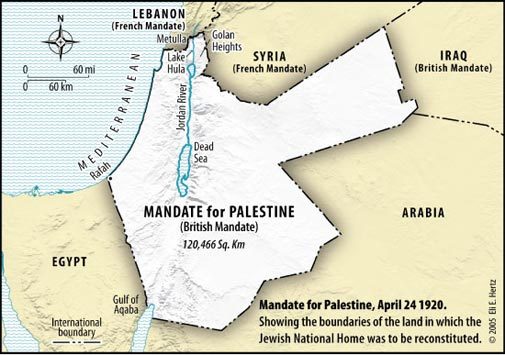
Even more inexplicably, nobody ever talks about it. I've never seen anyone complain that Jordan was stolen from Palestinians. Possibly because Jordan is also the only country that gave Palestinian refugees full citizenship, and it's about half Palestinian now.
Israel is nearly 25% Arab Palestinians with full citizenship and equal rights, so it's not all that different -- but the fundamental difference of living in a country where the majority is Jewish, not Muslim, probably runs pretty deep.)
Anyway: that's why Palestine is Gaza and the West Bank, rather than being some contiguous chunk of land. Or being the land set aside by the U.N. in 1947.
Because Arab countries took that land in 1948, and treated them as essentially separate for 20 years.
Israel got them back, along with the Golan Heights and the Sinai Peninsula, in the next war: 1967, when Egypt committed an act of war by taking control of the waterways and barring Israel from them. It gave the Sinai back to Egypt as part of the 1979 peace accords between Egypt and Israel.
Israel tried to give back the Gaza Strip at the same time. Egypt refused.
Palestine finally declared independence in 1988.
But Hamas formed at about the same time. Probably in response, in fact. Hamas is fundamentally opposed to peace negotiations with Israel.
Again: Hamas is part of a group founded by Nazis.
Hamas has its own charter. It explains that Jews are "the enemy," because they control the drug trade, have been behind every major war, control the media, control the United Nations, etc. Basic Nazi rhetoric.
It has gotten adept at masking that rhetoric for the West. But to friendlier audiences, its leaders have consistently said things like, "People of Jerusalem, we want you to cut off the heads of the Jews with knives. With your hand, cut their artery from here. A knife costs five shekels. Buy a knife, sharpen it, put it there, and just cut off [their heads]. It costs just five shekels."
(Palestinians were outraged by this speech. Palestinians, by and large, absolutely loathe Hamas.
It's just that it's not the same to say that to locals, as it is to say it where major global powers who oppose this crap can hear you.)
Hamas has stated from the beginning that its mission is to violently destroy Israel and take over the land.
It has received $100M in military funding annually, from Iran, for several years. Because Iran has been building a network of fascist, antisemitic groups across the Middle East, in a blatant attempt to control more and more of it: Hezbollah in Lebanon. The Houthis in Yemen.
Iran has been run by a very far-right, deeply antisemitic dictatorship for decades now, which pretty openly wants to take down both Israel and the U.S.
Last year, Iran increased Hamas's funding to $350M.
The "proof of concept" invasion of Israel that Hamas pulled off on October 7th more than justifies a much bigger investment.
Hamas has publicly stated its intention to attack "again and again and again," until Israel has been violently destroyed.
That is how this conflict came about.
A Nazi group seized power in Gaza in 2007 by violently kicking the Palestinian government out, and began running it as a dictatorship, using it to build money and power in preparations for exactly this.
And people find it shockingly easy to believe its own hype about being "the Palestinian resistance."
As well as its propaganda that Israel is not actually targeting Hamas: it's just using a literal Nazi invasion and massacre as an excuse to randomly commit genocide of the fraction of Palestine it physically left 20 years ago.
Despite the fact that Palestinians in Gaza have been protesting HAMAS throughout the war.
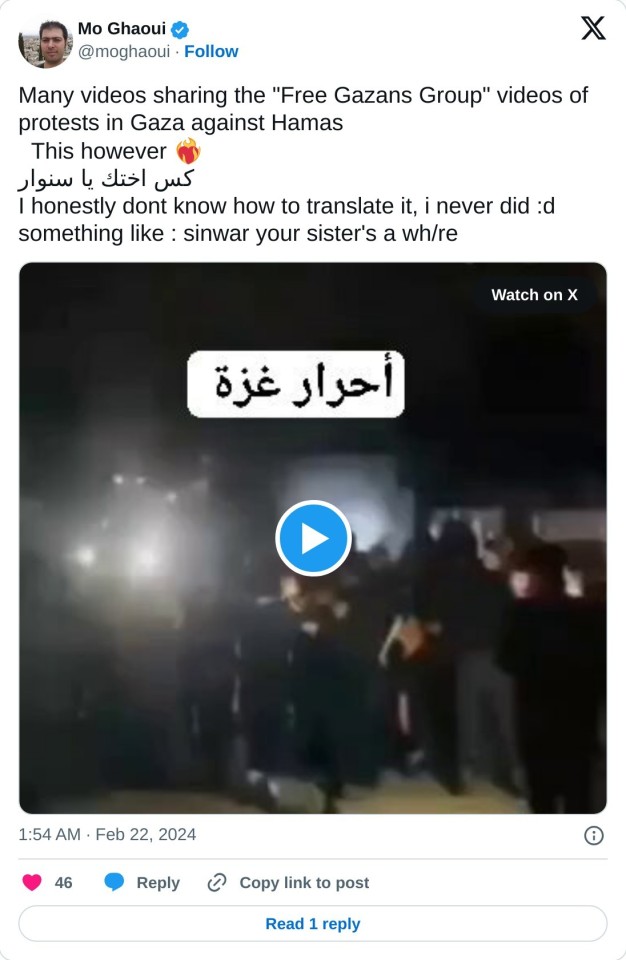
#free palestine#free gaza from hamas#free everyone from hamas it's awful#we want to live movement#free gazans group#center the people directly affected#Ironically it's almost exclusively zionists who know about and support the actual activists in Palestine#because Zionism is a real Jewish term for self-determination not something you can redefine to demonize us#and the pro-hamas movement is inherently both antisemitic and anti-Palestinian#wall of words#jumblr#jewish history#palestinian history
807 notes
·
View notes
Text
Land Day - March 30th
Every year on the 30th of March, Palestinians all across Palestine, yet especially those living inside the 1948 green line (governed by the Israeli government) revive the memory of ‘The Land Day’ (in Arabic : Yawm Al-Ard), a day that first became of significance in the year 1976 when the Israeli government announced the plan that it had in mind, to take and expropriate thousands of dunams of land from Palestinian citizens for “state purposes”… this led the Palestinian citizens living under Israeli rule to take on a general strike and go out in protests and demonstrations in large number against such a decision that deprives them from the lands that they own privately.
On the protests of March 30th 1976 the IOF killed 6 Palestinians (Khadeejah Qasem Shawahneh, Kheir Ahmed Yassin, Raja Hussein Abu Rayya, Khader Eid Mahmoud Khalailah, Mohsen Hasan Sayyed Taha, Ra’afat Ali Zuheiri) while injuring and arresting hundreds more…
Many literary and artistic pieces have been dedicated to the memory of Palestinian Land Day by various authors and artists, the most famous piece being a poem written by the renowned Palestinian author and poet Mahmoud Darwish named “Al-Ard” (which translates to “The Land” in English).
The BDS movement is encouraging people from all over the world to organize huge protests and demonstrations on Land Day, as it is a day that holds a big part of the Palestinian struggle, which is the struggle to take back the stolen lands that were expropriated by the occupation’s government.
So what will you be doing this Land Day (March 30th 2024) to help raise Palestinian voices ?
#gaza#palestine#free gaza#from the river to the sea palestine will be free#gazaunderfire#save gaza#gaza strip#gazaunderattack#stand with gaza#free palestine 🇵🇸#land day#march 30th#يوم الارض#palestinian lives matter#stand with palestine#save palestine#long live palestine#palestinian history#stop palestinian genocide#don’t stop talking about palestine#dont stop talking about palestine#stop the occupation#stop the genocide#stop the war#end the genocide#stop israel#anti zionisim#end the apartheid#end the occupation#end the siege
1K notes
·
View notes
Text
Baby and Children's Zip Ties
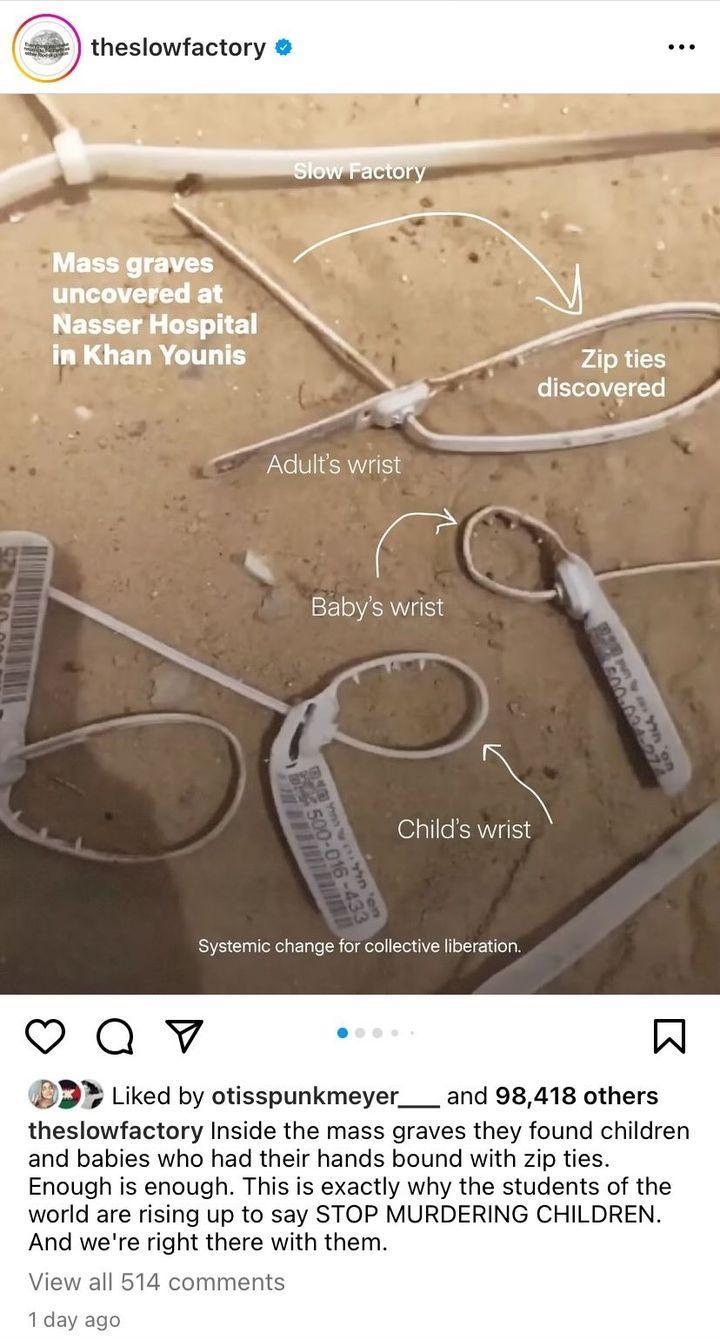
Inside the mass Graves that were uncovered at Nasser Hospital, Khan Younis, Gaza, they found children and babies who had their hands bound with zip ties.
#photography#gaza#palestine#palestinians#free palestine#islam#islamophobia#israel#war crimes#war criminals#israeli war crimes#crimes against humanity#israel is committing war crimes#crimes against children#crimes against women#nakba#al nakba#nakba 1948#nakba 2023#palestinian history#genocide#ethnic cleansing#mass murder#free gaza#genocide joe#genocide in gaza#genocide in palestine#anti zionisim#zionistterror#zionazis
461 notes
·
View notes
Text
I am posting and responding to this ask anonymously as I don't want anyone harassing its sender. This has already been communicated with the person who sent the ask.
I just want to thank you for being a light in the darkness of anti-semitism, especially on this website. I have found I am on this site a lot less ever since it was made clear that other leftists here are more anti-semitic than we ever knew possible, using very specific wording of our own trauma against us (i.e. saying stuff like "colonialism", "genocide/ethnic cleansing", and calling JEWISH PEOPLE Nazis).
It feels like, at best, they know Hamas ≠ All or even most Palestinians, but think that they think all JEWS = Bibi; and at worst, agree with Hamas and think of him as some sort of "freedom fighter".
So, thank you from one leftist Jew to another, just trying to keep afloat here. ❤️
You are very welcome; it's certainly been overwhelming, and I'm glad this can be a safe space for you.
I do want to push back on some of this ask, though. Specifically in regard to terms such as "colonialism," "apartheid," "genocide," and "ethnic cleansing."
The use of these terms is not inherently anti-Semitic. For a lot of people, these terms are the best ones they have access to describe what they are seeing. I do think such terms as “colonialism” and “apartheid” are overly simple in regard to the last ~3000 years of Jewish history, and that they cast the situation into an alien historical context which dilutes and uncomplicates the all the historical realities at stake, but I truly do not think that all who use these terms do so to cause Jewish people pain.
Further complicating the picture is that terms like "colonialism" aren’t completely wrong. Modern Zionism arose in the context of mid-nineteenth century European large-scale movements towards nationalism (ie, the creation of nation-states) and away from the multi-national empire. Jews—a subject of anti-Semitism and fifth columnist suspicions within those emergent European nations—reacted to all this by joining the nationalism game.
What’s ironic, is that those European Jews who founded contemporary Zionism were reacting to the exclusion and racial hatred with which Gentile Europeans treated them, and then once they had some settlements in Palestine, they deployed similar variants of racial hatred at both the Palestinian Arab population, and Middle Eastern Jewry.
The existence of a distinct people and ethnic group in Palestine before the aliyot were not something the first generation of Zionists were concerned with. Because they were part of the same shitty, white supremacist, pro-imperialistic intellectual European tradition to which they were responding as victimized parties. As time went on and Zionist thought spread across Ashkenazic communities, we can see some variants. Some forms of far-left Zionism in twentieth century Poland, for example, actively built the presence and rights of Palestinian Arabs into their ideology, some of them actively stating that Zionism could not be a success if it necessitated transforming Palestinian Arabs into a group of secondhand citizens and a cheap source of labor in their own home.
Those leftist strands of Zionism tended to be Socialist/Communist in nature, and centered around the idea of life in Eretz Yisrael as one of a series of self-sufficient communes. Thus when the 1930s hit and things start to go bad, the Zionists we see fleeing to Palestine tended to be of the more centrist and far right variants. The left wing, socialist movements, already operating as a collective, had a membership uncomfortable with fleeing to safety while the rest remained behind.
And that same socialist/communal attitude, is why those variants of Zionist thought never made it into the Israeli political mainstream; most of their members and proponents were murdered in the Holocaust in part because they refused to leave their comrades behind. The General Zionists and Zionist Revisionists who rode out the years of the Holocaust in Palestine therefore already had access to the avenues of power which would become important in 1948, when the British Empire shrugged off its responsibilities towards the regions it colonized and destabilized.
Now, as for ethnic cleansing. I can’t sugar-coat this: that’s what the Naqba was. It was ethnic cleansing of Palestinian Arabs from their homes to make way for the Jewish State. The manipulative shit (but still somehow extremely prestigious) youth group I was in taught us that Arabs call it Naqba because they hate Jews and therefore existence of Jews in the Southern Levant was a tragedy, as was the fact that Hitler didn't finish the job.
That’s garbage: it’s called the Naqba because it was ethnic cleansing. And that's not the fault of the Holocaust survivors who made their way to Mandatory Palestine/Israel in the late 1940s--they lacked political power, and were often looked down upon by those who did; the Holocaust as part of Israeli National Mythology wasn't an immediate Thing.
If you spent your formative years around older Jewish folks of A Certain Generation, whose trauma has pretty much placed a permanent block on their ability to see some of what went down in 1948 for what it was, I can’t blame you for having that gut/cognitive dissonance reaction to the use of “ethnic cleansing” in the context of Israel and Palestine. I know those older folks. I loved them. They’re mostly gone now, and I miss them terribly. But their trauma-induced view of everything lives on in the ability of some younger Jews to properly name and understand what it is that happened in 1948.
It was ethnic cleansing.
Further, not only were Palestinian Arabs ethnically cleansed, but the Middle Eastern and North African (MENA) Jews who were forced by their governments to flee their homes of thousands of years and seek refuge in Israel throughout the second half of the twentieth century…the Western and Central European Jews in control of Israel and its institutions treated them like shit too. Hadassah actively stole the babies of Yemeni Jews, told the parents that their children were dead, and rehomed them to Ashkenazic couples. There were death certificates. Members of the Ethiopian Jewish community were forcibly sterilized, and their ongoing treatment by the State is racist and generally atrocious. And this analysis of the relationship between the Israel State, MENA Jewish populations, and different Ashkenazic groups in Israel is horribly short and overly simple.
As for genocide. I honestly don’t know. I do know many people, who are very much not Anti-Semites, who are calling what’s happening in Gaza right now genocide; many of these people are also Jewish. I know many others who refer to the experiences of Palestinians between 1948 and now as a slow genocide. Many of these people are also actively not anti-Semites, and many of them are Jewish.
So these terms, as uncomfortable as they may feel for people within the very specific Jewish generational background I believe we share, are not deployed as anti-Semitic weapons. Nazi comparisons? Yes. Swastikas superimposed over the Star of David? Yes. Very specific hook-nosed Jewish caricatures in relation to Israelis? Yes. Blood libel shit? Yes. These are all anti-Semitic, and are deployed to hurt and retraumatize Jewish people. But the rest are not nearly that simple.
And I didn’t learn this from like, Bad Evil Post-Modern Academics at Columbia University Who Hate Jews; I learned this from doing graduate-level work in the field of Modern Jewish History, and working in Jewish archives; this did not come from outside the building.
Now, as for Hamas as freedom fighters…that’s ignorant at best. Hamas’ charter clearly calls for the global destruction of the Jewish people [ETA: they edited this part out in 2017 for PR purposes], and their actions as rulers are horrifically, violently, homophobic, and seem to be more abut provoking Israel than they are about governing and protecting their people. But as you said, Hamas isn’t all Palestinians, and it’s also not all Palestinians who consider themselves freedom fighters. (A second reader of mine had the following commentary on this paragraph: "Might need a bit more complication around Hamas? I know that's not your area of expertise but it's worth mentioning that they were basically set up to undermine the PLO and what would become the Palestinian Authority in the West Bank. You're right that they aren't representative of all Palestinian thought and resistance, and that they are on some fuck shit.")
So while I’m so glad that blog is a comfort to you, I encourage you to also take a step into some of your discomfort, and ask yourself where it comes from.
No one reading this post has my consent to use it to silence other Jewish people who are in different stages of their journey towards understanding how generational trauma has impacted their ability to grasp all of this. Further, if you choose to attack me for gently calling my people in, you're a piece of shit and I will be mean to you.
894 notes
·
View notes